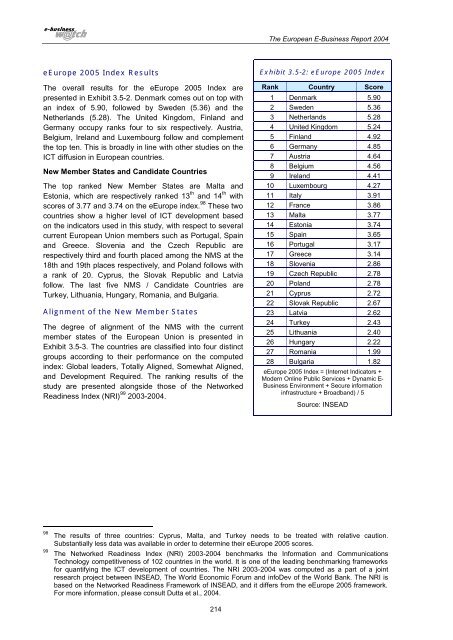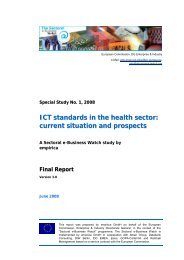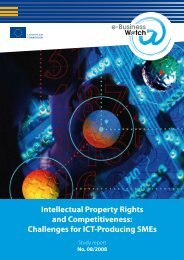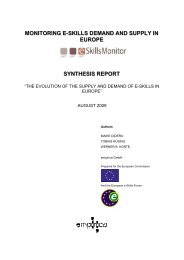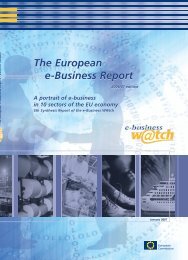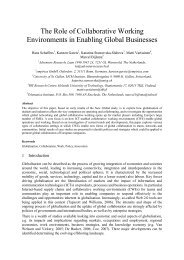The European e-Business Report 2004 - Berlecon Research GmbH
The European e-Business Report 2004 - Berlecon Research GmbH
The European e-Business Report 2004 - Berlecon Research GmbH
Create successful ePaper yourself
Turn your PDF publications into a flip-book with our unique Google optimized e-Paper software.
<strong>The</strong> <strong>European</strong> E-<strong>Business</strong> <strong>Report</strong> <strong>2004</strong>eEurope 2005 Index Results<strong>The</strong> overall results for the eEurope 2005 Index arepresented in Exhibit 3.5-2. Denmark comes out on top withan index of 5.90, followed by Sweden (5.36) and theNetherlands (5.28). <strong>The</strong> United Kingdom, Finland andGermany occupy ranks four to six respectively. Austria,Belgium, Ireland and Luxembourg follow and complementthe top ten. This is broadly in line with other studies on theICT diffusion in <strong>European</strong> countries.New Member States and Candidate Countries<strong>The</strong> top ranked New Member States are Malta andEstonia, which are respectively ranked 13 th and 14 th withscores of 3.77 and 3.74 on the eEurope index. 98 <strong>The</strong>se twocountries show a higher level of ICT development basedon the indicators used in this study, with respect to severalcurrent <strong>European</strong> Union members such as Portugal, Spainand Greece. Slovenia and the Czech Republic arerespectively third and fourth placed among the NMS at the18th and 19th places respectively, and Poland follows witha rank of 20. Cyprus, the Slovak Republic and Latviafollow. <strong>The</strong> last five NMS / Candidate Countries areTurkey, Lithuania, Hungary, Romania, and Bulgaria.Alignment of the New Member States<strong>The</strong> degree of alignment of the NMS with the currentmember states of the <strong>European</strong> Union is presented inExhibit 3.5-3. <strong>The</strong> countries are classified into four distinctgroups according to their performance on the computedindex: Global leaders, Totally Aligned, Somewhat Aligned,and Development Required. <strong>The</strong> ranking results of thestudy are presented alongside those of the NetworkedReadiness Index (NRI) 99 2003-<strong>2004</strong>.Exhibit 3.5-2: eEurope 2005 IndexRank Country Score1 Denmark 5.902 Sweden 5.363 Netherlands 5.284 United Kingdom 5.245 Finland 4.926 Germany 4.857 Austria 4.648 Belgium 4.569 Ireland 4.4110 Luxembourg 4.2711 Italy 3.9112 France 3.8613 Malta 3.7714 Estonia 3.7415 Spain 3.6516 Portugal 3.1717 Greece 3.1418 Slovenia 2.8619 Czech Republic 2.7820 Poland 2.7821 Cyprus 2.7222 Slovak Republic 2.6723 Latvia 2.6224 Turkey 2.4325 Lithuania 2.4026 Hungary 2.2227 Romania 1.9928 Bulgaria 1.82eEurope 2005 Index = (Internet Indicators +Modern Online Public Services + Dynamic E-<strong>Business</strong> Environment + Secure informationinfrastructure + Broadband) / 5Source: INSEAD9899<strong>The</strong> results of three countries: Cyprus, Malta, and Turkey needs to be treated with relative caution.Substantially less data was available in order to determine their eEurope 2005 scores.<strong>The</strong> Networked Readiness Index (NRI) 2003-<strong>2004</strong> benchmarks the Information and CommunicationsTechnology competitiveness of 102 countries in the world. It is one of the leading benchmarking frameworksfor quantifying the ICT development of countries. <strong>The</strong> NRI 2003-<strong>2004</strong> was computed as a part of a jointresearch project between INSEAD, <strong>The</strong> World Economic Forum and infoDev of the World Bank. <strong>The</strong> NRI isbased on the Networked Readiness Framework of INSEAD, and it differs from the eEurope 2005 framework.For more information, please consult Dutta et al., <strong>2004</strong>.214


